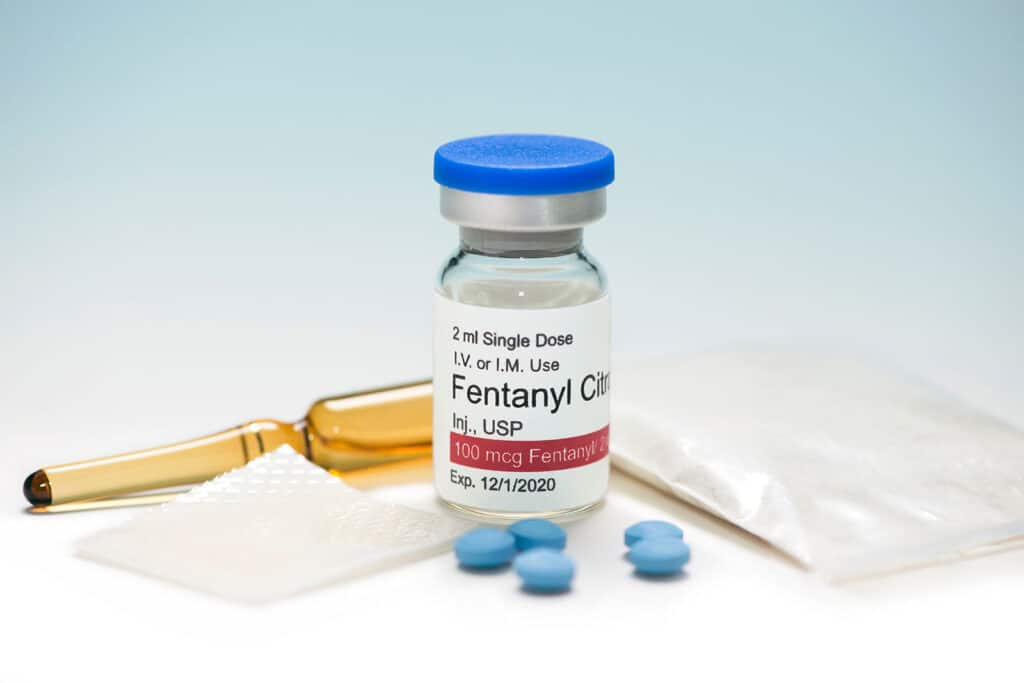Fentanyl is an extremely potent opioid drug that was initially developed for relieving severe pain. However, because it’s so potent, fentanyl is highly addictive when misused.
According to the CDC, fentanyl caused 73,838 overdose deaths in the US in 2022 alone. Yet, only a few seek help for fear of stigma, life disruptions, and high costs.
So, what can you do if you or one of your family members are struggling with fentanyl addiction?
In this article, we shed light on the various treatment options you can take to recover from fentanyl addiction. Please put your worries aside. There’s an accessible program for every patient!

Table of Contents
What Is Fentanyl?
Fentanyl is a prescription drug that’s 50 to 100 times more powerful than morphine. Doctors use it to treat cancer patients or people who have surgery.
Prescription fentanyl comes in lozenges, Duragesic patches, or shots. In its illegal form, this synthetic opioid may get mixed into nasal spray and eye drops.
In some cases, dealers also add fentanyl to other counterfeit prescription opioids.
Fentanyl can become addictive if you misuse it. It binds with your opioid receptors, causing euphoria and sedation. Overdosing on fentanyl can cause coma and even deadly respiratory depression for some.

Signs of Fentanyl Addiction
Often, people who suffer from substance use disorder think they’re in control. Unfortunately, they can quickly spiral into addiction.
If you know anyone taking fentanyl, it’s vital to identify the warning signs before it’s too late!
1. Physical Signs
Some of the physical effects of fentanyl use include drowsiness, small pupils, and changes in appetite. You may have intense flu-like symptoms and a decreased respiratory rate.
People with opioid addiction may also hide the injection sites and infections on their arms with long sleeves.
2. Behavioral Signs
The side effects of fentanyl abuse include changes in behavior. Users can become irritable or giddy at times.
They may start avoiding family members and friends. Their performance at school or work also worsens.
3. Changes in Surroundings
If you have a loved one suffering from addiction, you may discover some changes to your environment.
Prescription medication may start going missing. Moreover, you may find burnt spoons and bags with powder residue around the house.

Fentanyl Addiction Treatment
Recovering from fentanyl addiction takes more than just stopping the drug use. Below are the processes and treatment options you should expect.
1. Assessment and Medical Detoxification
The first step in any treatment plan is assessment.
A healthcare professional will check your physical and mental condition. At the same time, they may ask you about your drug history and background.
Your treatment plan will depend on the severity of the addiction. Plus, doctors will take your budget and availability into consideration.
After assessment, you begin medical detoxification. For fentanyl addiction, it’s best to stay at the treatment center during this time. The reason for this is so that a medical professional is present to address life-threatening withdrawal symptoms.
To help you through the detox process, you may receive medication-assisted treatment.
All About Medication-Assisted Treatment
Medication-assisted treatment is when doctors use other types of drugs to reduce your cravings and symptoms. It addresses the physical and psychological aspects of the addiction to ensure your well-being.
Below are some medications you may receive during the substance abuse treatment.
- Methadone: Methadone is an analgesic drug that can substitute opioids. Although addictive, it’s safer than other narcotics, and doctors may prescribe it.
- Naloxone: Narcan, or naloxone, is a medication that can reverse the effects of fentanyl overdose. It works by displacing opioids in our brain receptors.
- Naltrexone: Naltrexone is a long-term medication that can prevent relapses. It reduces cravings, and doctors use it as part of a comprehensive treatment plan.
- Buprenorphine: Buprenorphine is one of the most common medications for treating an opioid use disorder. It’s an opioid drug weaker than methadone, so it can diminish your physical dependency.
2. Behavioral Therapies
Behavioral therapies are a crucial component of fentanyl addiction treatment. Therapies address the root cause of the issue and change the way you think and act.
There are many approaches to behavioral therapy. In fact, there’s no one-size-fits-all treatment. Some therapies may focus on building life skills, while others may teach coping mechanisms.
Keep in mind that what works for others may not work for you. Because of this, you may need to try several sessions.
Behavioral therapy is a must because it supports long-term healing. They form the foundation of your recovery!
Behavioral Therapies to Attend
Below are a few examples of behavioral therapies you may attend at the recovery center.
- Cognitive Behavioral Therapy: CBT is a therapy that changes negative thought patterns. It can identify the source of dysfunctional behavior and replace negative thoughts with positive ones.
- Motivational Interviewing: Motivational interviewing is an approach where you work with your counselor. You’ll draw upon personal motivations to make better decisions.
- Dialectical Behavior Therapy: DBT is an effective therapy for people suffering from depression. You learn to accept yourself as you work towards a positive change.
- Family Therapy: Family and group therapy works on resolving conflicts and improving communication. With your family’s support, you can recover from fentanyl addiction with more ease.
3. Treatment Programs
Treatment programs are structured interventions that address substance use issues. They combine various therapeutic approaches to help with your mental health.

There are many treatment programs available, and what you get depends on your circumstances. Your doctor will customize your treatment program, fitting sessions to your specific needs.
It’s best to look through your treatment options. Knowing what’s available can help you select the plan that’ll be most effective.
Some factors to consider when choosing a program are the level of care and duration you need to recover. In addition, you should pick what’s accessible, affordable, and comfortable for you.
Treatment Programs to Consider
These are some of the most common treatment programs you may encounter at the rehab center.
- Inpatient Treatment: During inpatient treatment, you receive 24/7 supervision from medical professionals. Inpatient treatment is best for those expecting life-threatening withdrawal symptoms from the fentanyl.
- Intensive Outpatient Treatment: An outpatient program is suitable for patients who want to continue school or work. Here, you attend therapy sessions three to five times weekly, then return home for the night.
- Partial Hospitalization: This rehab program also lets you return home in the evenings. That said, partial hospitalization offers you a higher level of care and more intense treatments.
- Dual Diagnosis Treatment: Dual diagnosis is for those who suffer from addiction and a mental health disorder. It addresses both of your conditions simultaneously to give you a better chance of success.
4. Support Systems and Aftercare
Recovery is a lifelong journey, and your support systems and aftercare play an essential part in that.
Support systems are the people and resources that help you emotionally and socially. They encourage and motivate you to overcome difficulties.
Aftercare, on the other hand, is the ongoing sessions you attend with your therapist.
Your support and aftercare help you transition from treatment into regular daily life. They also prevent you from relapsing as you slowly make progress.
Support Systems and Aftercare for Fentanyl Addiction
Research shows that people who receive continuous care have a lesser risk of relapse. Here are the support systems and aftercare you can depend on after receiving treatment.
- Family and Peers: Your family and peers are the people who affect your life the most. They play a role in supporting and encouraging you through your recovery.
- Professional Support: Receiving professional support means attending sessions with counselors, doctors, and therapists. Regular check-ins can address emerging issues and prevent you from relapsing.
- Support Groups: One of the most widespread support groups is Narcotics Anonymous. It’s a group that holds regular meetings for people to share their experiences.
- Community Resources: These are the educational and wellness programs you attend after rehab. Community resources improve your mental and physical health, leading you to develop a better lifestyle.

What Can You Do to Help a Loved One?
If you have family members going through fentanyl addiction, educating yourself on how to approach the situation is key.
Simply telling someone to stop doesn’t work in most cases. Remember that fentanyl affects mental health, and your loved one may react negatively to your intervention.
Be sure to let your loved one know you’re there for them should they want to join a treatment program. Offer emotional support and maintain a non-judgmental attitude.
Finally, we recommend consulting a counselor for the best steps to take. You can also attend support groups to learn more about what you can do to help!
Conclusion
Fentanyl addiction treatment is a series of programs that can take months to complete.
You’ll undergo assessment, medical detox, and behavioral therapies. Moreover, expect to join a treatment program and various support groups.
It’s understandable if you feel that recovering from fentanyl addiction is a challenge. Still, you should know that you can get through it with the help of family and medical professionals!
Please contact Illinois Recovery Center to learn about Fentanyl Addiction Treatment near you.



